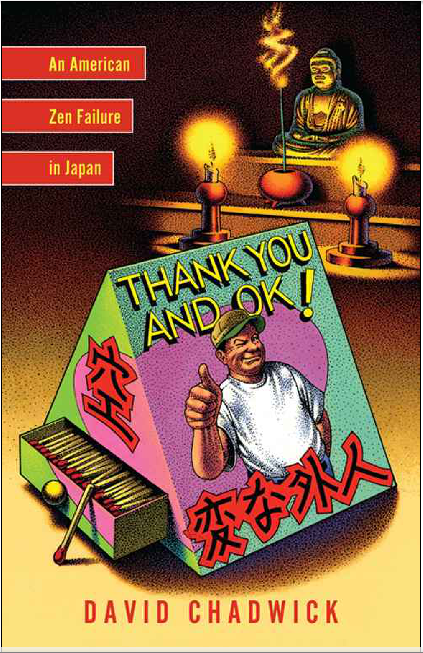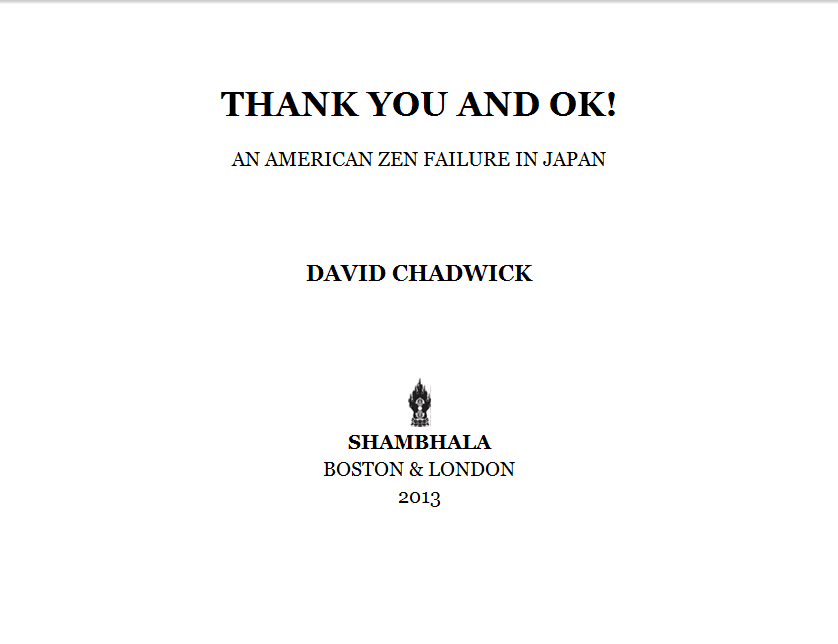Thank You and OK!: an American Zen Failure in Japan
home page for TY&OK -
Index with links to chapters
Next - Contents
Cover and Front Matter
|
Front Matter praise for the book about the book about the author title page publishing info page dedication epigraph or opening vignette pronunciation of Japanese terms notes
“Hats off to Chadwick. . . . His writer’s skill is evident in everything from skin-crawling descriptions of mukade (dreaded scorpion-like insects) to a benevolent look at takuhatsu, formal monks’ begging.” —Publishers Weekly “Written down with good humor and keen observations. . . . This book is not a serious examination of Zen Buddhist practices nor a major study of East-West relations but a rollicking, anecdotal mishmash of incidents about the foibles of monks, abbots, ‘housewives,’ and fellow students of the author’s. Read with this understanding, this book is good entertainment.” —Library Journal “Vivid, lighthearted, and unself-consciously profound.” —Kirkus Reviews “The Catch-22 of Zen.” —Daniel Leighton,
author of Faces of Compassion “Totally delightful—fantastic couch potato Zen. Chadwick saves you the trouble of going to Japan by making all the mistakes for you.” —Jack Kornfield ABOUT THE BOOK David Chadwick, a Texas-raised wanderer, college dropout, bumbling social activist, and hobbyhorse musician, began his study under Shunryu Suzuki Roshi in 1966. In 1988 Chadwick flew to Japan to begin a four-year period of voluntary exile and remedial Zen education. In Thank You and OK! he recounts his experiences both inside and beyond the monastery walls and offers insightful portraits of the characters he knew in that world—the bickering monks, the patient abbot, the trotting housewives, the ominous insects, the bewildered bureaucrats, and the frustrating English-language students—as they worked inexorably toward initiating him into the mysterious ways of Japan. Whether you’re interested in Japan, Buddhism, or exotic travel writing, this book is great fun. To learn more about the author, David Chadwick, visit www.cuke.com. DAVID CHADWICK, a Texas-raised wanderer, college dropout, bumbling social activist, and hobbyhorse musician, began his Zen study under Shunryu Suzuki Roshi in 1966. Chadwick now lives in Northern California where he reads, writes, walks, and continues to dabble in Buddhism and related matters. [Now, February 2016, and since Dec. 2013 living in Bali, Indonesia.] Shambhala Publications, Inc. © 1994 by David Chadwick Cover illustration by Alex Murawski All rights reserved. No part of this book may be reproduced in any form or by any means, electronic or mechanical, including photocopying, recording, or by any information storage and retrieval system, without permission in writing from the publisher. Library of Congress
Cataloging-in-Publication Data Thank you and OK!: an American Zen failure in Japan/David Chadwick. p. cm. To learn more about
Shambhala books, visit us online to sign up at
shambhala.com/eshambhala.
TO AHDEL AND KELROY MY PARENTS
A NOTE ON APPROXIMATE JAPANESE PRONUNCIATION
A is similar to the "a" in father I is similar to the "ea" in eat U is similar to the "oo" in look E is similar to the "e" in egg O is similar to the "o" in go said quickly
Examples taken from An introduction to Modern Japanese by Osamu and Nobuko Mizutani, Japan Times. _____________________________________________________________
This book is about events that took place between April of 1988 and April of 1992.
The value of the yen fluctuated in that period, but think of 1000 yen as worth roughly eight dollars. next - CONTENTS |

